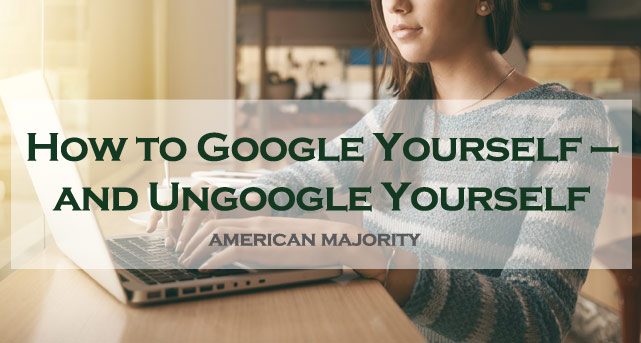Blog
How to Google and UnGoogle Yourself
June 25, 2015

It is no secret that the internet never forgets anything, but too often people fail to realize that it also applies to their information. Are you one of them? Have you recently googled yourself to see what information shows up?
Unlike the past where you could keep information about yourself relatively safe by withholding certain details (phone number, last name, etc.), today’s instant communication and endless retention of data means that as long as someone has your first and last name, a veritable trove of information is available on the internet. Do you know what all is on there? Everything from old social media profiles and public records to opinions on blogs and everything in between.
It won’t just be friends that will look you up: employers are increasingly using the internet to look into potential employees. Remember that dumb thing you posted after you got a little tipsy one night? Chances are that now your employer does, too.
The same goes for images. Do you know what your name is tied to? Remember that the internet remembers everything: pictures, videos, it’s all there. When you Google yourself (you’re convinced now, right?), make sure to go through more than just mentions. Fortunately, you have options if you find something objectionable.
First Steps to Finding Yourself Online
1. Old Social Media Accounts
First, you should be able to locate your various social media accounts and delete/modify if necessary. Sites like Facebook and Twitter have password recovery options if you haven’t visited in some time and don’t remember your login information. If you should find something that isn’t directly under your control, don’t fret, you still have choices: utilize the Digital Millennium Copyright Act. It says that “[u]pon receiving proper notification of claimed infringement, the provider must expeditiously take down or block access to the material.” See Section 512(c) of the DMCA for more details. If that doesn’t work for some reason, you should discuss it with your lawyer.
2. Searching Google Images
Sometimes your name will be tagged with pictures or images that have nothing to do with you. This can come from from a variety of sources, from someone mentioning you in a comment with a picture they posted, to other people with the same name being tagged from their pictures. In any case, it is important to see what images your name brings up when searched: make it a point to look at not just the web results, but also the “images” tab therein.
3. Google Alerts
Assuming you’ve cleared up everything you didn’t want on the web, how do you protect yourself in the future? There are a number of programs available to help protect your identity.vOne of the easiest and cheapest (it’s free) option is Google Alert. Google Alert will enable you to track whenever a name, phrase, email address, or number is posted on the web (note: this could generate a LOT of mentions so choose carefully!), this way you know when you are getting mentioned online. While it won’t necessarily protect from advanced hackers, you will be alerted to possible objectionable content posted on the web as soon as it’s posted.
4. Privacy Settings
Remember that Google records a heck of a lot of information: location history, device history, search history, the list goes on and on. If you haven’t checked your privacy settings in a while, you should do that too…
…right after you Google yourself.
For more suggestions, make sure to visit this USA Today post, “Why you should Google yourself now.”
